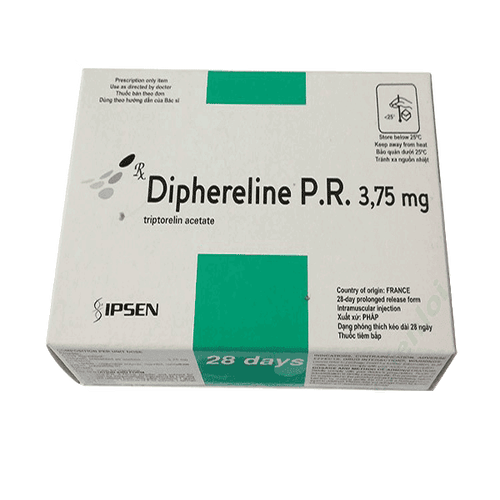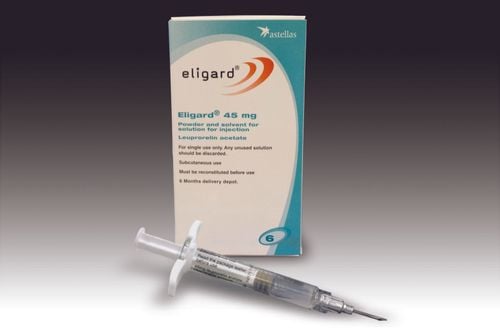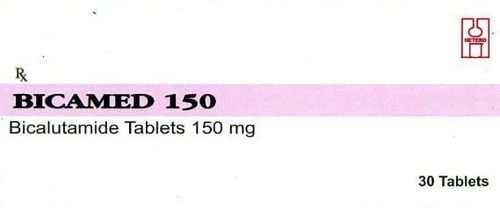This is an automatically translated article.
Apalutamide is used to treat prostate cancer that has spread to other parts of the body or has metastasized. It is also used while being treated with another medicine or with surgery.
1. What does Apalutamide do?
Apalutamide is a potent androgen receptor (AR) antagonist that selectively binds to the ligand-binding domain of AR and prevents AR nuclear translocation or binding to androgen-responsive elements. It works in the body by blocking the actions of androgens or male hormones.Apalutamide is used to treat prostate cancer that has spread to other parts of the body (metastasized) and is also being treated with other drugs or with surgery.
Apalutamide is also used to treat prostate cancer that has not spread to other parts of the body, after surgery or treatment with other cancer treatments that have not responded to this treatment. treat.
Apalutamide is used together with Gonadotropin-releasing hormone (GnRH) or with surgery to remove the testicle (castration).
Apalutamide may also be used for purposes not listed in this medication guide.
2. Important information when taking Apalutamide
Although, Apalutamide is not for women. However, exposure to this drug during pregnancy can cause birth defects in the baby.
You need to follow all instructions on the medicine label and packaging. In addition, you need to tell your healthcare provider about all medical conditions including allergies and all medications you take.
3. What should be noted before taking Apalutamide?
Apalutamide is not intended for use by women or children. Apalutamide may harm an unborn baby or cause a miscarriage. The medicine can also harm an unborn baby if the father is being treated with this medicine at the time of conception or while the mother is pregnant. When using Apalutamide for treatment, you need to use effective birth control if your partner can become pregnant. Also, you need to continue using effective birth control and condoms for at least 3 months after your last dose of this medicine. Apalutamide may affect fertility. However, it is important to use birth control to prevent pregnancy, because the medicine can harm your baby if you become pregnant. You also do not donate sperm while you are taking this medicine and for 3 months after your last dose of treatment. To make sure Apalutamide is safe for you, tell your doctor if you have:
Have a head injury or brain tumor; Recent experience or history of epilepsy; Stroke ; Cardiovascular disease or hypertension; Diabetic pathology; Abnormal levels of cholesterol or fats in your blood. Hormonal cancer treatment can weaken your muscles and bones. You are more likely to break a bone while using or being treated with Apalutamide. Therefore, you should consult with your treating doctor about ways to keep your bones healthy.
4. How should you take Apalutamide?
You need to use Apalutamide exactly as prescribed by your doctor. Also, be sure to follow all directions on the medication label and read all medication instructions or leaflets. Your doctor may sometimes change the dosage depending on your medical condition. Apalutamide is not affected by food, so you can take it with or without food. You should take the medicine at the same time every day to avoid forgetting the dose. The usual dose of Apalutamide is 4 tablets taken at the same time once daily. Follow your doctor's instructions for medication carefully. Swallow the Apalutamide tablet whole and do not crush, chew, or break the tablet. You are checked and evaluated for clinical indicators regularly. You should not stop using Apalutamide unless your doctor tells you to. Store Apalutamide at room temperature away from moisture or extreme heat and light. Keep the tablets in the original container, along with the package or preservative container containing the desiccant pack.
6. How to use and dose of Apalutamide
The usual adult therapeutic dose for prostate cancer is 240 mg orally once a day In case of missed dose: Take the medicine as soon as possible, but skip the missed dose if it is almost time. use the next dose. Never use a combination of both doses at the same time.
In case of drug overdose: You need to contact and immediately go to the nearest medical facility for timely treatment and correct treatment regimen.
7. What should be avoided when using the drug?
When using Apalutamide you need to avoid driving, operating machinery or doing dangerous activities until you know how the effects of Apalutamide will affect your health. Your response to medication may be impaired. Apalutamide can cause convulsions. Avoid activities that could be dangerous if you experience a sudden seizure.
8. Undesirable effects of the drug Apalutamide
You should contact and get medical care if you have signs of an allergic reaction to Apalutamide including hives, difficulty breathing, swelling in your face or throat, or a serious skin reaction including include fever, sore throat, burning eyes, skin pain, red or purple skin rash with blistering and peeling.
Contact your doctor immediately if you have the following signs:
Chest pain accompanied by discomfort (even while resting); Shortness of breath; Presence of a seizure; signs of a stroke such as sudden numbness or weakness (especially on one side of the body); Severe headache; Stuttering or balance problems. Elderly people using Apalutamide may experience falls. You need to take care to avoid a fall or accidental injury while you are being treated with this medicine.
Common side effects of Apalutamide may include:
Hot flashes; Digestive disorders such as diarrhea, loss of appetite; Weight loss; Increased fatigue; Fall, fracture; Rash, rash on the skin; Pain in joints; Hypertension . This is not a complete list of possible side effects and other undesirable effects. You can contact your doctor for medical advice about side effects on your health.
9. Apalutamide drug interactions
Other drugs may interact with Apalutamide, including prescription and over-the-counter medicines, vitamins, and herbal products. Tell your treating doctor about all current medicines you are taking and any medicines you start or stop using.
Some possible drug interactions when co-administered with Apalutamide:
Afatinib: The serum concentration of Afatinib may be reduced when it is combined with Apalutamide. Bretuximab vedotin: The serum concentration of Brentuximab vedotin may be reduced when it is combined with Apalutamide. Dabigatran: The serum concentration of Dabigatran etexilate may be reduced when it is combined with Apalutamide. Ledipasvir: The serum concentration of Ledipasvir may be decreased when it is combined with Apalutamide. Linagliptin: The serum concentration of linagliptin may be reduced when it is combined with Apalutamide. Paliperidone: The serum concentration of Paliperidone may be reduced when it is combined with Apalutamide. Sofosbuvir: The serum concentration of Sofosbuvir may be reduced when it is combined with Apalutamide. Mifepristone: The serum concentration of Apalutamide may be increased when it is combined with Mifepristone. Succinic Acid: The excretion of succinic acid may be reduced when combined with Apalutamide. L-Citrulline: The excretion of L-Citrulline can be reduced when combined with the drug Apalutamide. During use, you need to keep Apalutamide and all other medicines out of the reach of children and pets. Never share your medication with someone else and only use Apalutamide as prescribed.
Please dial HOTLINE for more information or register for an appointment HERE. Download MyVinmec app to make appointments faster and to manage your bookings easily.













